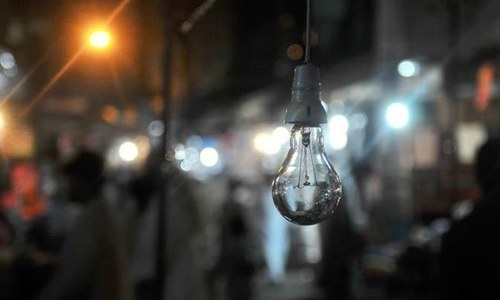ISLAMABAD: With the power sector circular debt in excess of Rs900 billion, independent power producers (IPPs) were questioned by the Inquiry Commission on Debt (ICD) on Monday about their purported higher than permissible profit margins.
The ICD was constituted by Prime Minister Imran Khan to probe increase in the country’s debt during the tenure of the previous two governments.
Claiming that the IPPs had a zero contribution to increase in the country’s debt in the past decade, a representative of the IPPs’ Advisory Council (IPPAC) told a news conference after a session with the inquiry commission that they had contractual rights to settle any dispute through international arbitration.
IPPAC member and chief executive of Hub Power Company Khalid Mansoor told the media that the ICD led by National Accountability Bureau deputy chairman Hussain Asghar had called them for a briefing on the day they were required to provide data regarding their tariff setting, approval process and subsequent profitability.
He said one-year data was provided to the ICD along with a formula as to how the IPPs could share the past data and the record of the tariff-setting proceedings in a timely manner. He said the general narrative of the commission appeared to be that IPPs earned profits that were three to four times greater than permissible levels. He said the circular debt was in excess of Rs900bn and about Rs370bn of as many as 22 IPPs was overdue against the government.
Advisory council of power producers says IPPs reserve right to go for international arbitration
Serious allegations were being levelled against IPPs at different levels and forums including the ICD, the Senate standing committee on power, NAB and other government institutions.
He said the general impression appeared to be that the IPPs earned unprecedented windfall profits but there was a “huge gap in understanding” of those raising suspicions.
Asked if the IPPs felt arm-twisting or how they had planned to confront the situation, Mr Mansoor said it was not yet clear what could be the objective of those raising allegations. Yet the IPPs were cooperating with the ICD and would come up with a counternarrative while interacting with the Senate committee as well as the PM on the issue, he said.
He said the ICD was informed that the IPPs were producing 50pc of the country’s total electricity supply and it would be unfair to change ground rules in the middle of contracts. “Do whatever you want to do but also consider its fallout. The country’s risk would go up and so will the premium for investment,” he claimed to have told the commission.
He said the IPPs had also suggested to the government to engage independent expert consortium to look into the matter but “you cannot change anything unilaterally”.
Asked as to why the IPPs were evasive to heat rate tests, Mr Mansoor said it was not an issue but the tests were not covered by the contracts and principles should be set in advance as to the consequences. He said some IPPs might be spending extra money for higher than contractual efficiency and it should be clear at the outset if the government was ready in case of lower than those levels.
As a country, “we should learn from the past”, he said, adding that some IPPs had won international arbitration for non-payment of dues but then in the country’s interest they were engaging with the government for a settlement agreement.
He said the IPP model had played a key role in attracting the necessary foreign and local investment required to alleviate power crisis in Pakistan and all projects were set up under prevailing government policy. He said the IPPs operated in a highly regulated environment with stringent government and regulatory approval processes at each stage of project development, execution and subsequent operations as per applicable prevailing policies and approved tariff and then all invoices were paid to the IPPs with prior regulatory approvals and audits by the power purchaser.
The key reasons for the circular debt and high consumer tariff were excessive transmission and distribution losses, power theft, inefficient power generation by publicly owned GENCOS, and low recoveries from consumers by DISCOs.
The IPPs bear most of the consequences of the circular debt and end up taking a significant hit on their returns due to time value of money as well as high interest cost on working capital.
He said only 60pc of the total cost of power actually related to generation while 20pc to high transmission and distribution losses and 20pc related to taxes. Unlike changing dynamics of renewable technology, the thermal technologies (RFO, Coal, and Gas) were technologically more mature and therefore their capital costs was highly subject to the price movement of equipment raw material, availability of EPC contractors and long timelines affected by vulnerable exchange rate fluctuation.
Published in Dawn, July 23rd, 2019














































